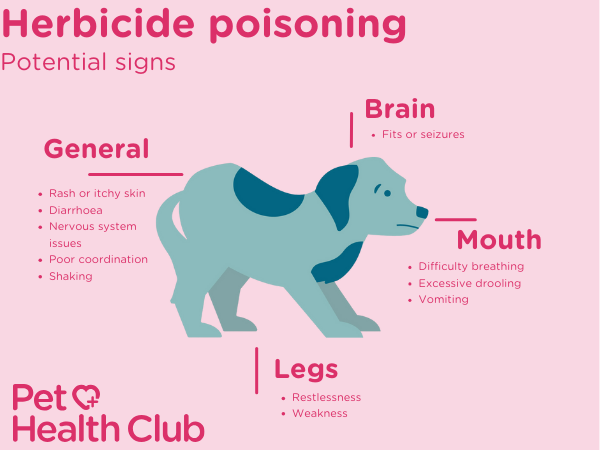Is weed killer safe for dogs?
Most over-the-counter weed killers (also known as herbicides) are generally safe around dogs if used correctly and allowed to dry on treated areas. However, exposure to certain herbicides, especially when wet, can cause health issues ranging from stomach upsets to severe poisoning. It's really important to read the label on weed killer and follow application guidelines. You should also prevent your dog from accessing treated areas until they're dry, and seek immediate veterinary care if your dog does come into contact with any chemical product.
Which chemicals should dog owners avoid?
Problems tend to occur when dogs are exposed to herbicide that hasn’t been given enough time to dry, or because of improper use or disposal. If a dog swallows or licks herbicide, they can become ill, and some effects might take a long time to show. The table below lists some common herbicides and their dangers to dogs.
| Chemical | Usage | Signs of Poisoning |
|---|---|---|
| Glyphosate | Widely used in agriculture and gardens for weed control. | While low in toxicity, glyphosate can be harmful when combined with other chemicals used on lawns and weeds. Signs of poisoning can include vomiting, reduced appetite, tiredness, diarrhoea, tremors, and breathing issues. |
| Phenoxyacetic compounds (e.g., 2,4-D) | Commonly used in agriculture and residential lawn care. | Generally safe for dogs if used correctly and allowed to dry, but large doses can cause weakness, respiratory issues, and problems with the nervous system. |
| Chlorophenoxy herbicides | Frequently found in lawn feed and weed products, available in granular form or as a liquid. | Symptoms include drooling, vomiting, abdominal discomfort, lethargy, ulcers in mouth, bloody stools, lower appetite, progressive weakness, and muscle stiffness. |
| Benzoic acid herbicides | Mainly used for controlling broadleaf weeds in crop fields, orchards and vineyards. | Can cause skin irritation and stomach upset. Exposure to large amounts may lead to muscle stiffness, problems with coordination, and shaking, although this is rare. |
| Pyridine, dinitroaniline, benzamizole | Found in various weed killer products. | These are generally recognised as low toxicity chemicals. In rare cases, exposure may cause stomach upset and discomfort. |
| Dipyridyl herbicides (e.g. paraquat, diquat) | Used for rapid weed control, effective even in small amounts. | Vomiting, abdominal pain and depression appear first. This is followed three to four weeks later by severe respiratory issues and kidney failure, which is often fatal. |
Sources: Pet Poison Helpline and Merck Veterinary Manual

Symptoms of weed killer poisoning in dogs
Symptoms such as difficulty breathing, convulsions, and stomach upsets can occur following exposure to some herbicides. It's important to remember that these symptoms can be caused by other issues too. However, if your dog became sick soon after you applied weed killer to your lawn, and they were fine before that, the weed killer might be the reason. These are the most common symptoms of herbicide poisoning:
- Vomiting or diarrhoea
- Strained or laboured breathing
- Restlessness or abnormal behaviour
- Fits or seizures
- Muscle tremors
- Excessive drooling
- Reduced appetite
- Abdominal (tummy) discomfort
Read more: How to help a constipated dog
What to do if you're concerned about herbicide poisoning?
If you have concerns about exposure to herbicides, contact your vet right away. It’s recommended to bring the chemical bottle with you, or take a picture, so the vet can look closer at its ingredients. It’s also helpful if you know how much contaminated grass your dog has eaten and when they ate it - did they have a brief nibble, or did they not stop eating grass until you told them to stop? If your dog has had access to the actual weed killer product (i.e. licked up a spill or got at the bottle), rather than just contaminated grass, seek veterinary advice urgently. As always, prevention is better than cure. When using any weed-killing agents, make sure you carefully follow the instructions on the bottle. As you apply the chemical, keep your dog somewhere contained and safe — preferably indoors — and give the treated area a chance to dry before letting your dog near it.
Can weed killer kill dogs?
This is uncommon for most over-the-counter weed killers used by gardeners, but theoretically, weed killers can be fatal if your dog ingests a large amount, e.g., if it drinks it from the bottle following a spillage. To be extra safe, make sure you keep weed killer and other chemical-based household products safe and secure in a place your dog can’t access. If you spill chemicals, clean up the mess immediately and keep your dog away from the affected area until it dries.

Read more: Safety tips for keeping your pet safe
Treatment for herbicide poisoning
The severity of weed killer poisoning in dogs will depend on how much herbicide or contaminated grass your dog has eaten. Treatments can vary and may include the administration of activated charcoal or other adsorbents as well as supportive care such as fluids and medication to manage symptoms. It's important to be cautious and to contact your vet if you notice any of the symptoms listed above.
Research into herbicide poisoning in dogs
The study Detection of herbicides in the urine of pet dogs following home lawn chemical application investigated the presence of herbicides in dogs' urine after exposure to treated lawns, revealing widespread contamination even on untreated lawns due to what's called chemical drift. Findings indicated that herbicides remained on grass for more than 48 hours and longer under certain weather conditions. The research suggested a need for further study to evaluate the risks of herbicide exposure in both humans and pets.
Another study, entitled Canine exposure to herbicide-treated lawns, investigated the absorption of the herbicide 2,4-dichlorophenoxyacetic acid (2,4-D) by dogs on treated lawns. Findings revealed that dogs exposed to lawns treated with 2,4-D had significant levels of the herbicide in their urine, especially within two days of application. The risk of exposure decreased over time but remained detectable for up to a week. Given 2,4-D's potential link to cancer, such as lymphoma in dogs, pet owners are advised to keep their pets off recently treated lawns and to monitor their health for any signs of herbicide poisoning.
This study Paraquat intoxication and associated pathological findings explored the effects of paraquat, another toxic herbicide, on dogs. When ingested, inhaled, or absorbed through the skin, paraquat caused severe respiratory and gastrointestinal symptoms, progressing to significant lung damage and systemic failure. Despite treatments aimed at reducing absorption and managing symptoms, all affected dogs were put to sleep due to the poor prognosis. The study highlighted the urgent need for effective treatments and raised awareness of the high risks associated with paraquat.
Need more info?
There are plenty of methods of keeping both your garden and your dog protected! For further information about weed killer poisoning or any aspect of your dog’s welfare, have a chat with your vet.
Find your nearest vet using our find a vet page, or speak to a vet online using online video vets.



